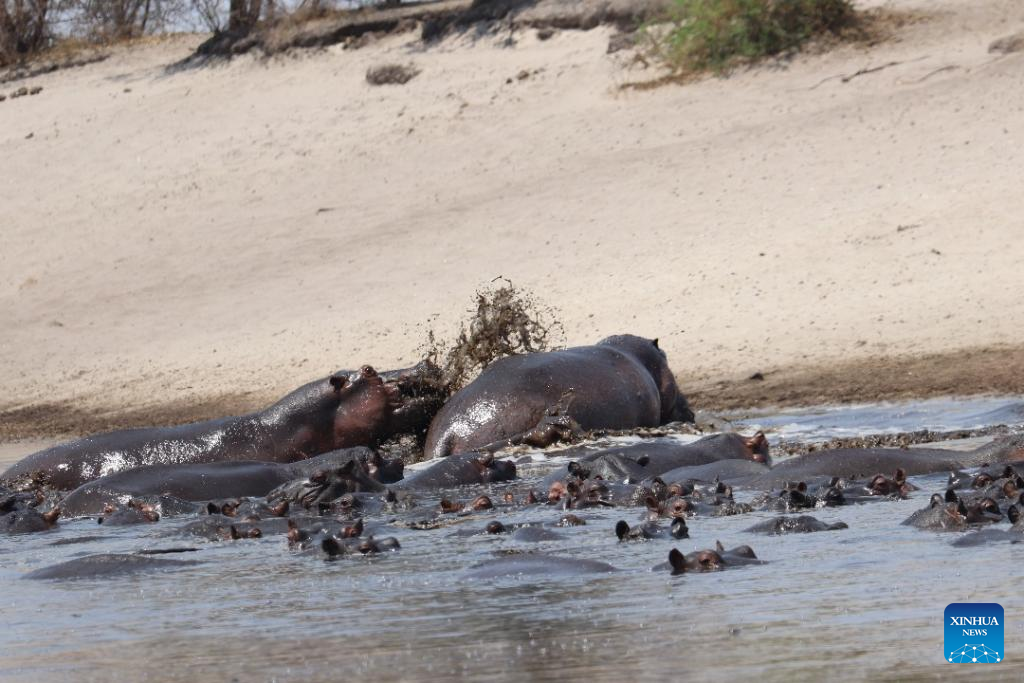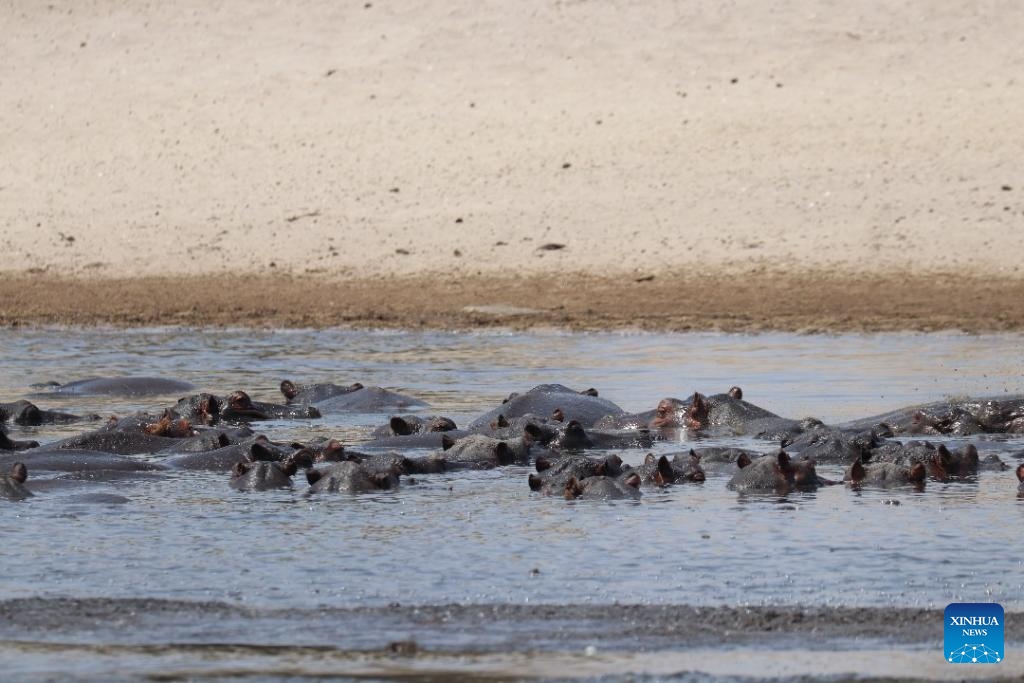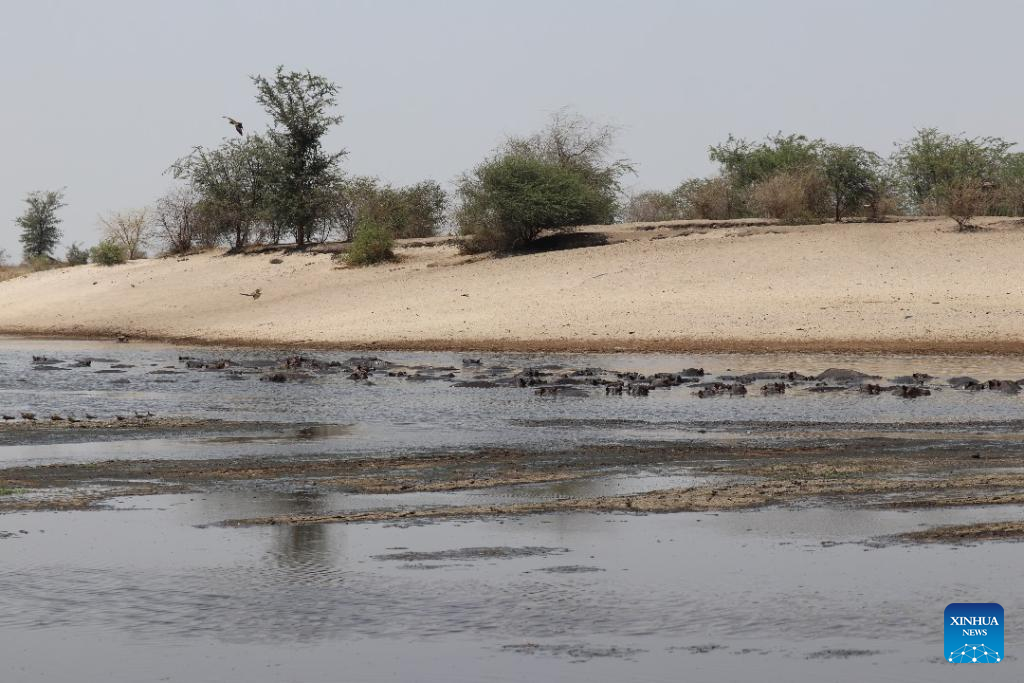


Stranded hippopotamuses are pictured at the Munambeza Pond in the Zambezi Region, Namibia, on Sept. 25, 2024.
About 130 hippopotamuses are stranded in the mud in northeastern Namibia, as water levels continue to drop due to severe drought, a government official said Wednesday.
To address this urgent situation, Namibia's Ministry of Environment, Forestry and Tourism is drilling boreholes to pump water into the Munambeza Pond in the Zambezi Region, spokesperson Romeo Muyunda told Xinhua. (Namibia's Ministry of Environment, Forestry and Tourism/Handout via Xinhua)
WINDHOEK, Sept. 25 (Xinhua) -- About 130 hippopotamuses are stranded in the mud in northeastern Namibia, as water levels continue to drop due to severe drought, a government official said Wednesday.
To address this urgent situation, Namibia's Ministry of Environment, Forestry and Tourism is drilling boreholes to pump water into the Munambeza Pond in the Zambezi Region, spokesperson Romeo Muyunda told Xinhua.
According to Muyunda, this is the second borehole drilled this year; the first was at Lugala in the Zambezi Region, where the water supply has improved conditions for the 135 hippos that were previously trapped in June.
Following the completion of the borehole at Munambeza, the team will move on to a third location called Sinde, which is also nearby, Muyunda said.
"The situation is caused by the drought we find ourselves in as a country, leading to water ponds drying out and hippopotamuses being stranded in some of these ponds," he said.
"The ponds we know of so far are three on the eastern side of the Zambezi Region. In one pond we visited on Tuesday, Munambeza, water levels continue to go down," he added.
According to Muyunda, these ponds not only sustain the hippopotamuses but also provide drinking water for other wild animals and livestock from neighboring communities.
"So this intervention is going to serve several purposes," he added.
Muyunda also warned of a potential rise in human-wildlife conflict, as the current situation may lead to competition for water resources.
"We want to urge the public to remain cautious at all times. If the situation calls for it, please contact the ministry to intervene if any wildlife comes into your area," he said.
Muyunda said the ministry is committed to wildlife conservation and is focused on saving lives rather than resorting to lethal measures.

Stranded hippopotamuses are pictured at the Munambeza Pond in the Zambezi Region, Namibia, on Sept. 25, 2024.
About 130 hippopotamuses are stranded in the mud in northeastern Namibia, as water levels continue to drop due to severe drought, a government official said Wednesday.
To address this urgent situation, Namibia's Ministry of Environment, Forestry and Tourism is drilling boreholes to pump water into the Munambeza Pond in the Zambezi Region, spokesperson Romeo Muyunda told Xinhua. (Namibia's Ministry of Environment, Forestry and Tourism/Handout via Xinhua)

Stranded hippopotamuses are pictured at the Munambeza Pond in the Zambezi Region, Namibia, on Sept. 25, 2024.
About 130 hippopotamuses are stranded in the mud in northeastern Namibia, as water levels continue to drop due to severe drought, a government official said Wednesday.
To address this urgent situation, Namibia's Ministry of Environment, Forestry and Tourism is drilling boreholes to pump water into the Munambeza Pond in the Zambezi Region, spokesperson Romeo Muyunda told Xinhua. (Namibia's Ministry of Environment, Forestry and Tourism/Handout via Xinhua)
点击右上角![]() 微信好友
微信好友
 朋友圈
朋友圈

请使用浏览器分享功能进行分享
